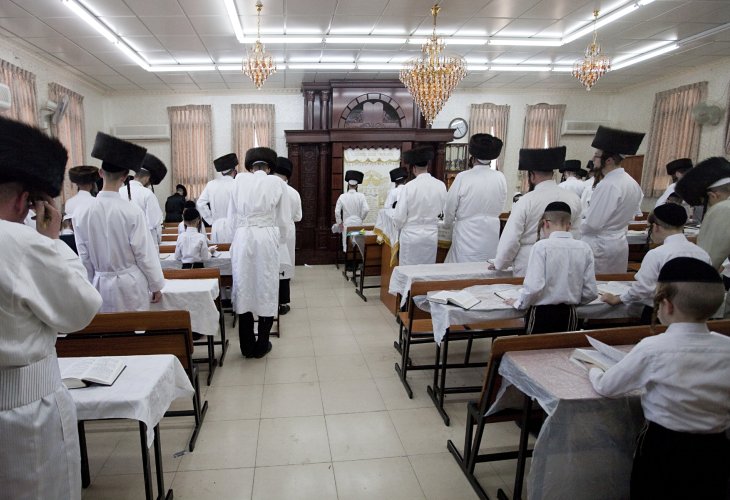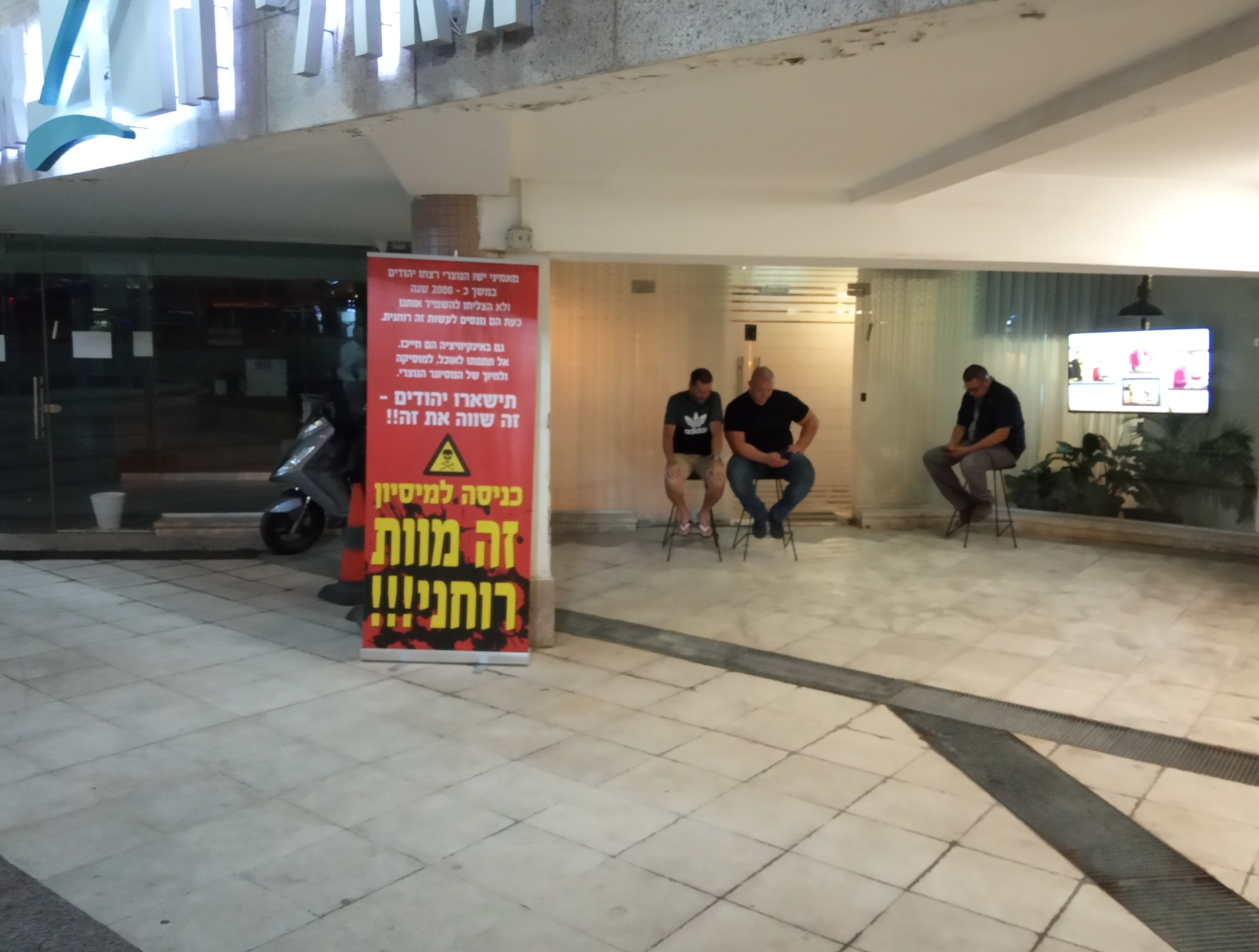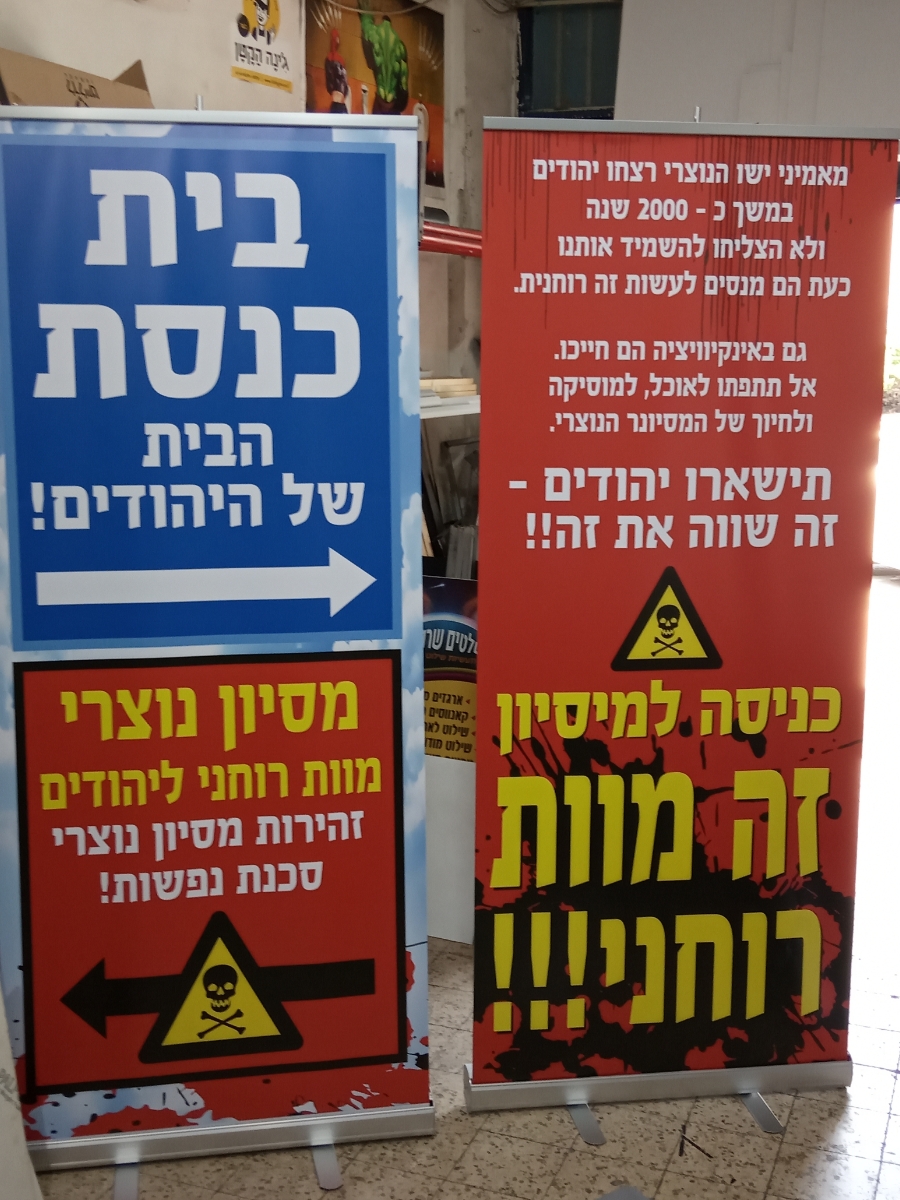"My Dad Took Me to the Synagogue on Yom Kippur Just to Tell Me: 'When You Grow Up, You Can Choose'"
He grew up in Tel Aviv as secular, then in Bnei Brak as a ba'al teshuva, and today he looks like a devout person from Mea Shearim, posting ads in the heart of the secular neighborhoods of Ramat Gan. His name is Heshel Richlevis and he is willing to do everything to bring another Jew closer to Judaism.
 (Illustration Photo: Flash 90)
(Illustration Photo: Flash 90)Everyone in Ramat Gan knows his Shabbat observance posters. They are in bright green, yellow, or pink, visible from afar, sharing Shabbat times and invitations to weekly classes, along with a strong stance against Christian missions and bringing souls closer to the world of Torah and commandments. "Do you know where I can buy tefillin?", Yosef Heshel Richlevis asked me during our first meeting. "Are you having a bar mitzvah for your child?" I responded, and upon receiving a negative answer, I realized there was more to the story.
From Bnei Brak to Ramat Gan
Yosef Heshel Richlevis (46), Tel Avivian at heart, returned to religion at 38, and today, besides being a yeshiva student learning from dawn until afternoon, he also works to bring his Jewish brothers closer to the Torah of Israel, closing businesses open on Shabbat, and fighting the Christian mission.

Why would a haredi Jew and a yeshiva student live in Ramat Gan and not Bnei Brak?
"A very good question. Indeed, after I returned to religion, I lived in Bnei Brak under the guidance of the rabbis, where you can immerse yourself in the world of Torah, in a pure and adorned environment, where every holiday is deeply felt and Shabbat's holiness dwells in the bones. After several years of refinement, my mentor and rabbi, Rabbi Dov Cohen Kook from Tiberias, instructed me to return to Ramat Gan, where I grew up most of my life, to work there for the benefit of strengthening and bringing others closer. The rabbi told me, 'Your destiny is not Bnei Brak, you need to return to Ramat Gan, that's your destiny.' So we packed our entire house in boxes and returned to Ramat Gan."
And did you really discover your purpose?
"Sure, I discovered it. It's hard for me to describe the upliftment and the feeling of giving pleasure to Hashem in strengthening and bringing close our fellow Israelites. Every class, every talk, and every mitzvah meal I do there are uplifting and strengthening, even though not everything is rosy, even though I've been beaten and insulted, people find it painful to see Torah flourishing. I arrived into a spiritual desert, a Sahara of dryness, where people are disconnected from any spark of holiness. I realized I'm not here in vain as a returning resident, with interest and linkage. I have a lot to do here, to strengthen and spread the light."
What did you do? How do you start from scratch?
"I started by trying to preach in synagogues. I would go to a synagogue I came across and ask to preach between Mincha and Arvit, but I quickly understood growth wouldn't come from there. The congregation in the synagogue was already on some level of mitzvah observance, and the true target was to create direct encounters with those who don't yet observe mitzvot and haven't met their Creator. I started in Elul by bringing great leaders, rebbes, and rabbis. I was also lucky to bring Rabbi Zamir Cohen to give a sermon at the Te'omim Synagogue in Ramat Gan. It is a warm and inviting place. From there, per my rabbi's guidance, I continued to preach and teach alone. Since then, I hold classes several times a week, conduct hilulot, and more activities. This all started last Elul."
And what happened next?
"After Elul, I told myself: 'This music can't stop.' I decided I would conduct a regular class on the weekly Torah portion. Don't laugh, but sometimes only one person would attend the class, but I didn't break. I told myself: 'Every soul is like a whole world.' Concurrently, I expanded the activities of posting flyers. Understand, it was all done independently with my own funds."
I'm Not a Fool
I try to imagine what it looks like in the secular street - a haredi who looks like he's from Mea Shearim, posting flyers in the heart of secular neighborhoods in Ramat Gan. Didn't you feel strange?
"Not only did I feel strange, but I also felt it physically. People would shout at me: 'This is not Bnei Brak; go to Mea Shearim,' but the words of the musar experts are always before my eyes, 'Do not be embarrassed by those who mock you,' 'and most importantly, do not fear at all.' Sometimes it also led to physical reactions, but I didn't let them drag me there."
How exactly did it work? You posted flyers, got yelled at and hit, and continued without any reaction?
"Don't exaggerate, I'm not such a fool. Of course, I responded, but my response was a Jewish response. For every flyer that people tore down, I posted two more, 'as they were oppressed, so they multiplied and spread.' Slowly but surely, they stopped tearing down my flyers and the activities expanded. Eventually, a group of regular attendees formed for the classes, and others occasionally joined as well. Sometimes, all kinds of issues surfaced for people who started coming to the classes, like marital issues or problems with their boss. I even had the chance to arrange celebrations at our synagogue and even a wedding, after a secular couple who married in a civil ceremony walked in one day and wanted me to marry them according to the law of Moses and Israel."
But you still haven't explained why you need tefillin?
"Hold on, take a breath, and you'll understand everything. My activities didn't end with giving classes. One day I discovered something that shocked me deeply - thirty meters from our synagogue, I discovered a mission, heaven have mercy. I couldn't believe such things exist in the Jewish state. In this mission, unsuspecting Jews were taught the New Testament, ultimately preparing them for conversion to Christianity.
"The real problem is that people don't know what they're getting into. They don't advertise with slogans like: 'Jew, come discover the New Testament,' because they know it wouldn't work. They approach through the back door, under the guise of social activities, like free English classes for children or free music lessons. Who wouldn't want that? During Chanukah, for example, they held a Chanukah party at the mission. The advertisements inviting people appeared with designs of a Star of David, a sufganiyah, and a menorah, looking completely Jewish. Worse yet, they would hang their ads even in synagogues. After luring people inside, they slowly drag them to the real purpose of their festivities. That's exactly how it works."
Alone in the Battle
What can a single person do against a well-oiled and skilled mission?
"As the sages say: 'Open for Me a breach as narrow as a needle's eye.' I initially didn't think I was going to lead a million-man protest against the mission, but I knew I had to open the breach. I found out the mission's opening hours, and during their activity, I, along with some Jews from the class, stood outside with signs explaining what truly awaited inside, so that a Jew would know what they might fall into."
And you really think it helped?
"I don't think so, I'm certain of it, I know because the mission's activity started to diminish, fewer and fewer people came, and it greatly bothered them. I had many arguments with the 'rabbi' of the mission about the pure truth, but I couldn't convince him. In parallel, they also hired burly security guards to keep me and my friends away from the place, but our path is one of pleasantness, not violence. We acted courteously, and today one of the guards is even a very good friend of mine."

Did you manage to rescue anyone from the mission?
"Yes, certainly, I rescued several dozen Jews through our activities, but the first Jew I rescued was done in a roundabout way. One day while doing routine errands in Tel Aviv, a secular woman approached me, asking if I was Heshel Richlevis. She recognized me from my previous life and was very surprised to see me, and asked for my help in rescuing her acquaintance from the mission. When I asked for details, it turned out to be the very mission against which I was taking action, in the Te'omim area of Ramat Gan. I contacted this holy Jew, we began talking about Judaism and Hashem, and he advanced very well. After a few months, I was already privileged to return him to Judaism through immersion, as required for a convert returning, and thank Hashem, yesterday he contacted me and asked if I could provide him with tefillin. That's it, this Jew is already ours, and he now lays tefillin. Now do you understand why I need tefillin at the age of 46?"
Great Disappointment
Tell me about your greatest disappointment.
"I have many disappointments, but that's my job, and I know it in advance. If you're talking about my greatest disappointment, it was when I came to live in Ramat Gan. I was on my way to the synagogue on Shabbat and suddenly noticed a kiosk open on Shabbat. I approached and saw there was not even a mezuzah on the doorpost. I decided to approach and talk to the holy Jew inside. Just as I began talking to him, he told me: 'I don't believe in Hashem, I'm an atheist, I sell chametz on Pesach,' and other familiar slogans the evil inclination loves to chant. But beneath the shell was a Jew with a very large soul. I didn't give up on him, and every Shabbat I would come in to wish him 'Shabbat Shalom, dear Jew.' As words tend to penetrate, they don't return void, and the shop owner began to soften slowly and agreed to talk with me. He told me he once had a mezuzah but removed it, but now he regrets it and wants one for his shop. We bought a mezuzah and held a mezuzah mounting ceremony. A few weeks later, he decided to open the shop two hours less each Shabbat. Not closing all Shabbat was very hard for him, but two hours seemed manageable. Slowly, every Shabbat he opened for fewer hours. Over time, he expanded his Shabbat observance until the shop closed completely on Shabbat. One mitzvah leads to another, and later he wanted to lay tefillin and even started praying a bit. That was the peak of excitement for me."
And what was disappointing about that? I asked Richlevis, who at these moments seemed to be drained of supernatural strength by the story of the shop.
"The disappointment lay in the fact that after so much physical and emotional investment, this dear Jew suffered a very bad heart attack and was shaken from all his commitments. Today, when I pass by his shop, which is now open on Shabbat, I enter to wish him 'Shabbat Shalom,' shed a tear and move on, keeping myself from breaking down. What sustains me is knowing that at least he lays tefillin every day, but it's important to remember he's not a bad person; his trials are truly unique and very difficult."
In conclusion, I'll ask you about your return to religion. When do you think the first spark began to burn within you?
"I was born completely secular, I didn't even observe Yom Kippur. Yet, as a child, my father took me once to the synagogue on Yom Kippur just to tell me, 'When you grow up, you can choose.' That's all I knew about Judaism, and that's the spark that penetrated me."
Your father actually managed to plant the roots unintentionally. Who is your father?
"My father was born during the communist revolution. He grew up in a secular home, detached from any spark of holiness, a Holocaust survivor, though he wasn't in a camp, but was busy day and night with escape and survival missions. When he immigrated to Israel, he established his home in Tel Aviv, near Kikar Hamedina, and later we moved to Ramat Gan."
In conclusion, Richlevis tells me, "In today's era of negligence, when those at the forefront are the mayors of Ramat Gan and Tiberias, it's precisely from these places that the rabbi from Tiberias sanctifies Ramat Gan. I see a lot of divine assistance in my deeds, but also much evil inclination trying to trip me, like my current trial of finding a permanent place where we can conduct spiritual activities. But every shop owner in Ramat Gan who hears the plans refuses to rent me the place, even though I took my kollel stipend and added it to the rent. Still, I am not giving up but continue to act, doing my part and sure that from above they will complete my work."
If you also feel like strengthening your heart in Ramat Gan, join Yosef Heshel Richlevis: heshelr@gmail.com

